Regarded as "a Citadel in the clouds", Sapa attracts so many visitors every year, both domestic visitors and travellers from around the world. Because of its special features, Sapa is always listed among the most desired destinations in Vietnam. Let's discover this country with Izitour to learn practical Sapa travel guide and know about the best things to see in Sapa.
- 1. Things to know before leaving for Sapa
- 2. Top attractions in Sapa: What to see & do
- 2.1. Ham Rong Mountain - Mount of the Dragon Jaw
- 2.2. Mount Fansipan - the rooftop of Indochina
- 2.3. Cat Cat Village
- 2.4. Ta Phin Village
- 2.5. Muong Hoa Valley
- 2.6. Sapa's waterfalls: Silver Waterfall and Love Waterfall
- 2.7. O Quy Ho Pass
- 2.8. The colourful ethnic markets
- 2.9. Sapa Town
- 2.10. Other off-the-beaten-path attractions in Sapa
- 3. Suggested itineraries for Sapa tour
1. Things to know before leaving for Sapa
1.1. Where is Sapa located?
Located in the mountains of northwestern Vietnam, Sapa is the central ward of Lao Cai Province, about 380 km from Hanoi and 38 km from downtown Lao Cai. Sitting at an altitude between 1,500 and 1,650 meters above sea level, the town is often shrouded in mist throughout the year, earning it the nickname “the town in the clouds”.
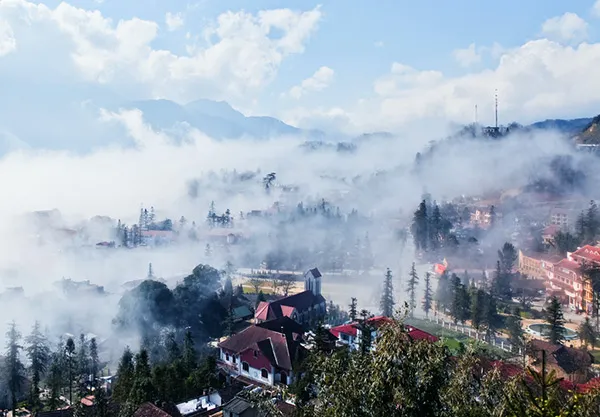
1.2. Why is Sapa so fascinating?
Pleasant weather & climate
Sapa's climate is cool all year round, the average temperature is between 15 - 18°C, especially in winter, the temperature could climb below 0°C and snow also appears. Therefore, as soon as the French first came to the area in the early 20th century, they built a tourist citadel to escape from the extreme heat of this tropical country in the summer.
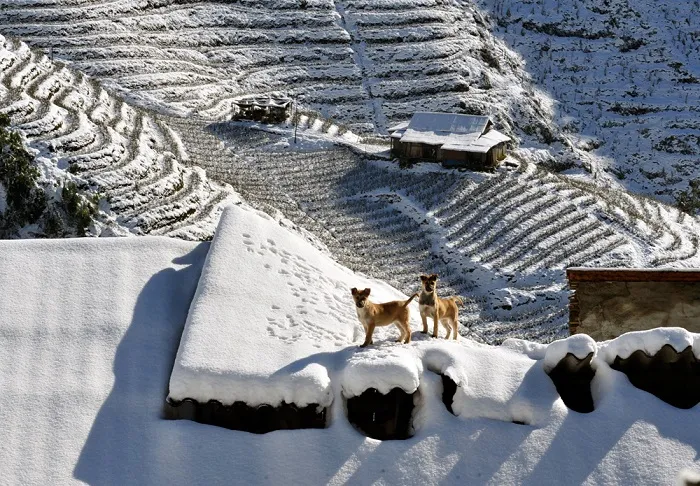
Breathtaking landscapes
Located in a high mountainous area with a temperate climate, Sapa offers stunning scenery that takes every traveller's breath away. At any time of the year, Sapa has its own distinct beauty. The harmony of mountains, natural forests, valleys, streams, and waterfalls with the simple houses of the locals and French architectural works creates a captivating charm. Visitors can lose their eyes between the green colour of nature and the colour of local life.
Unique rice terraces
Terraced rice fields are a masterpiece that demonstrates man's hard work and nature's creation. In Sapa, these terraces have existed for hundreds of years, and they were created by ethnic minorities in the area to grow rice on the mountainside.
Because of the harsh winter climate, they can only do one harvest a year in Sapa. Normally, in late April and May, they fill the terraces with water, making all the terraces become a giant mirror on the mountain. From June to August, the verdant rice plants grow, and from late August to September, you can smell the scent of rice in the air.
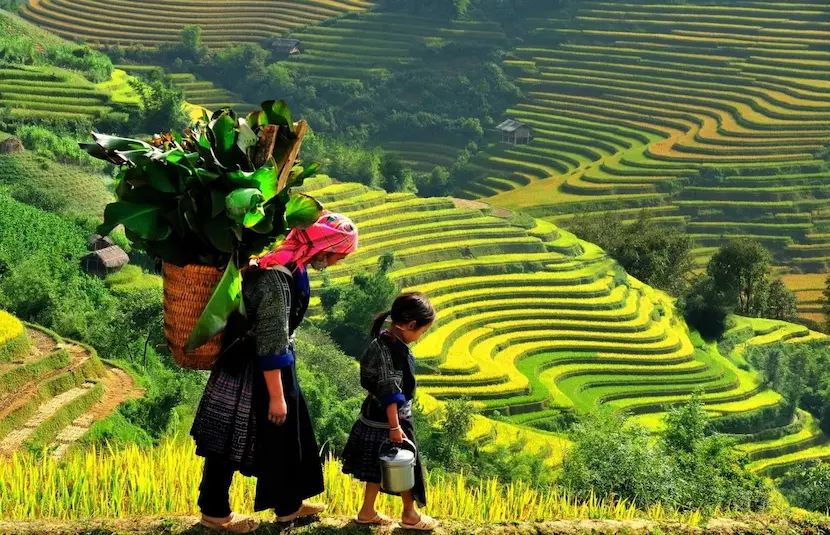
The beauty of ethnic minorities
Known not only for its natural beauty, Sapa is also home to a diverse mix of ethnic minorities, including the H'mong (who make up the majority of the local population), Tay, Red Dao, and Giay. Travelling to Sapa offers visitors the chance to experience the unique cultures and customs of these groups and witness the simple but joyful life of the highland people. Remarkably, they have maintained their vibrant traditional dress and customs quite well despite the growth of tourism, particularly in recent years. For this reason, visiting the ethnic villages in Sapa is a must-do activity for anyone exploring the area.
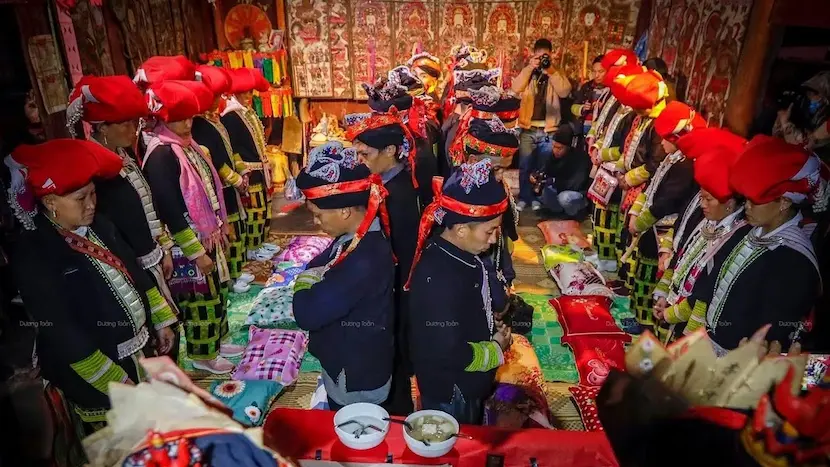
Enjoying the mountain flavours
Perhaps because of its clear and cool climate, the cuisine of Sapa has a unique flavour. Each specialty here has its own uniqueness. You can't miss the opportunity to taste Sapa's roasted skewers, armpit pork, five-colour sticky rice, smoked meat, or Thang Co, the area's special hot pot,...
Now, in the Silver Waterfall area, there is also salmon cultivation, so salmon dishes also become the specialties of Sapa.
1.3. When is the best time to visit Sapa
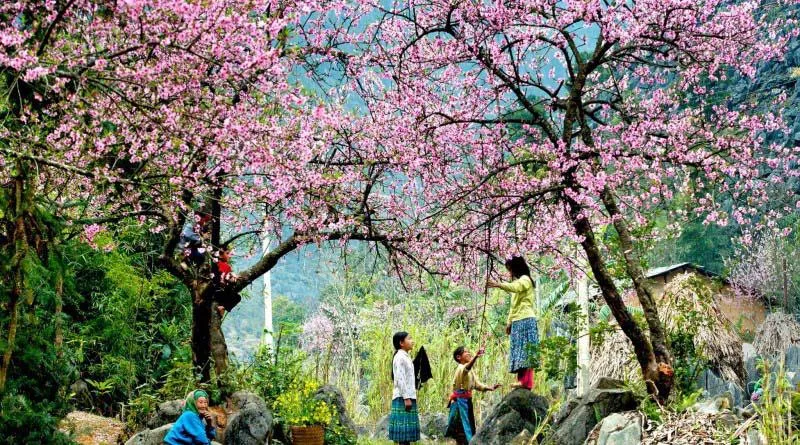
The best time to visit Sapa depends on what you're looking for in your trip. We can provide a seasonal breakdown as the following.
- Spring (February - May)
February - May is the time when many tourists choose to come to Sapa. The spring air covers the citadel of Sapa, a colourful shirt of peach blossoms, apricot blossoms.
April - May would be the time when people in Sapa start sowing and planting rice. Therefore, if you come to Sapa at this time, you will admire the vast terraced fields filled with water.
- Summer (June - August)
June - August is the ideal time for those who want to escape the sweltering heat of the big cities. The whole country of Sapa is covered in the colour green, from the verdant forest to the growing rice terraces.
- Fall (September - November)
In mid- or late September, Sapa is most attractive with golden ripe rice, which spreads enormously over the terraced fields, all over the mountains and hills, bringing enchanting scenery. This is the best time for photographers to hunt gorgeous photos of Sapa.
From October to November, Sapa starts to get cold. This is also the water season in Sapa, so the waterfall will flow strong, very lively and majestic.
- Winter (December - February)
From December to February, it is very cold in Sapa; in some places, the temperature even drops below freezing and it snows, especially at night and early in the morning.
The Sapa's scenery is most beautiful is from May to September.
1.4. How to get to Sapa from Hanoi
With a distance of 380km, the journey by car from Hanoi takes about 6-7 hours. Meanwhile, the train journey typically occurs overnight, departing around 10 PM and arriving at Lao Cai station around 7 AM the next day.
See more: 6 Ways to Get from Hanoi to Sapa?
2. Top attractions in Sapa: What to see & do
2.1. Ham Rong Mountain - Mount of the Dragon Jaw
Mount Ham Rong is located right next door in the centre of the citadel, just behind the ancient stone church of Sapa. Its name "Dragon Jaw" is taken from a story of a small Dragon who lost his way back to his home.
On the climb to reach the top of the mountain, there is a chance to enjoy the wonderful sceneries such as royal gardens, the cloud courtyard, the gateway to heaven... It seems that visitors are lost in a fairy tale.
- Opening hours: 07:00 AM - 6:00 PM
- Entrance fee: Adult: 70,000VND - Child: 20,000VND
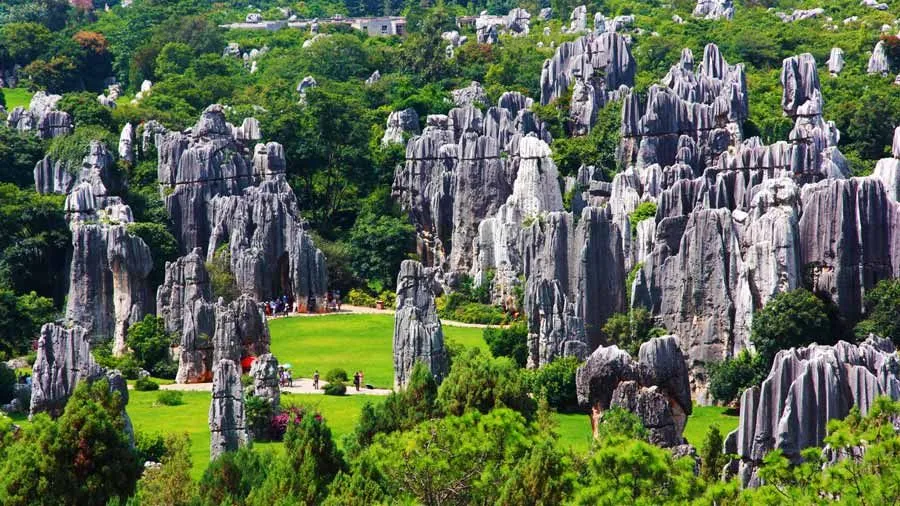
2.2. Mount Fansipan - the rooftop of Indochina
Mount Fansipan is a familiar name to any visitors who want to experience Sapa. This "Roof of Indochina" is located in the Hoang Lien Son mountain range, just 9km from downtown Sapa at an altitude of 3,143m above sea level. In the past, conquering Fansipan Peak meant navigating dangerous trails, and the journey could take 2-5 days depending on the climber's ability. Now, the fastest and easiest way to reach the peak is by cable car, with a 15-minute ride followed by a climb up hundreds of stairs. The panoramic scenery at the summit is simply stunning, with views that feel like walking among the clouds.
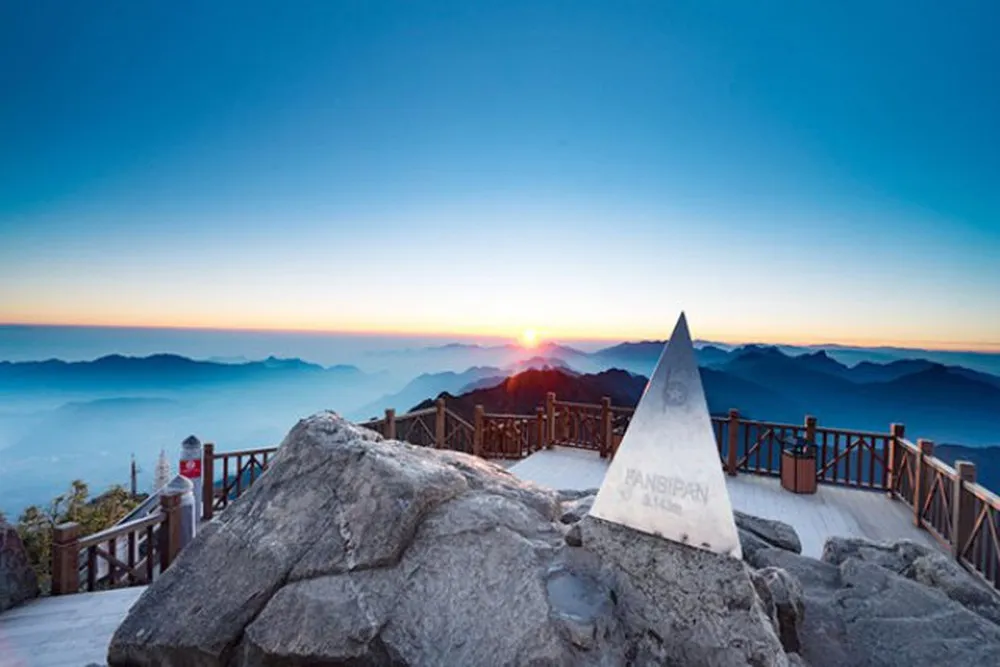
- Opening hours of cable car: 08:00 AM - 17:00 PM
- Entrance fee: Adult: 800,000VND - Child: 550,000VND
October - November and March - April are the best times to visit Mt. Fanxipan
2.3. Cat Cat Village
Cat Cat Village is located in San Sa Ho commune and is the residence of ethnic black Hmong. Only 3km away, Cat Cat is the closest village to the centre of the citadel. You can reach the village by car, scooter or even on foot easily. At the entrance of the village, there is a map and directions of the village landmarks, including the waterfall, art area where you can listen to the ethnic dance show for free, traditional house, stalls with traditional handmade products,...
However, due to its popularity, Cat Cat Village can get crowded on weekends and during peak travel season.
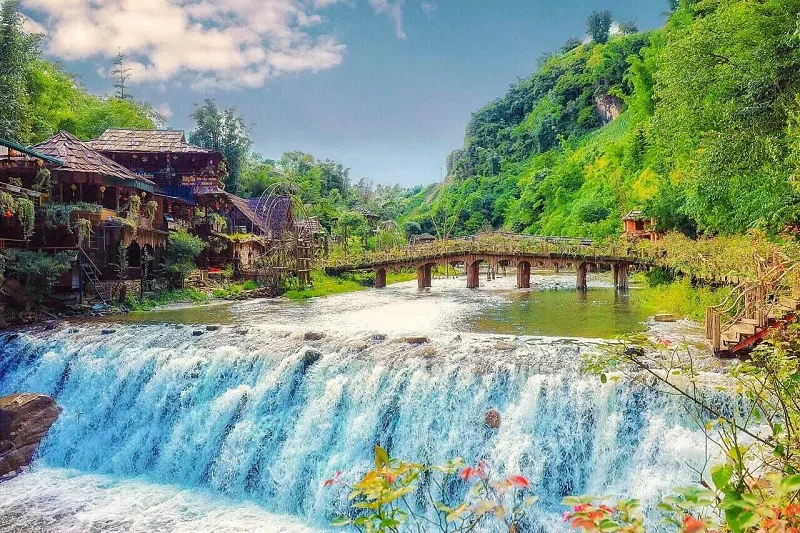
- Opening hours: 05:00 AM - 10:00 PM
- Admission fee: Adult: 90,000VND - Child: 50,000VND
2.4. Ta Phin Village
About 15km from the centre of Sapa, Ta Phin Village has a peaceful and very quiet beauty. Ta Phin is the main residence of two ethnic groups: the Red Dao and the H'Mong. Coming to Ta Phin village, you can meet local people who still dress in local costumes and do their daily chores. In addition, there are also many other things such as the traditional medicinal water making of ethnic Red Dao, the ancient stone courtyard, Ta Phin Monastery, the caves,...
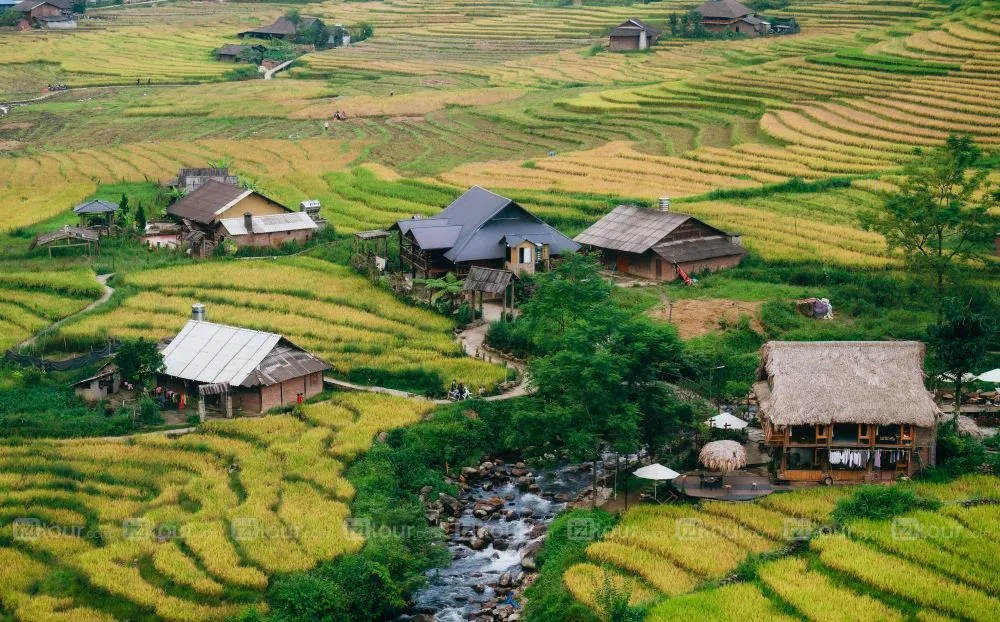
- Opening hours: all day long
- Entrance fee Adult: 40,000VND - Child: 20,000VND
2.5. Muong Hoa Valley
You cannot say you have visited all the landmarks of Sapa without putting your feet in the Muong Hoa Valley. Located about 8km from Sapa town, the valley is surrounded by the majestic mountains of the Hoang Lien Son Range. Possessing the pristine landscapes and fresh air, the valley is home to many ethnic minorities. Among the best-known villages in the valley like Y Linh Ho, Lao Chai - of the Black Hmong, Ta Van - of the Giay, Giang Ta Chai, Ban Ho of the Red Dzao, travellers can choose one of them to visit.
Coming to the Muong Hoa valley, in addition to the poetic villages, one also admires the cloud bridge, the gentle Muong Hoa stream flowing through the villages. The journey to Muong Hoa Valley touches all travellers' senses with the sound of flowing water, the scent of the earth, and the beautiful landscapes.
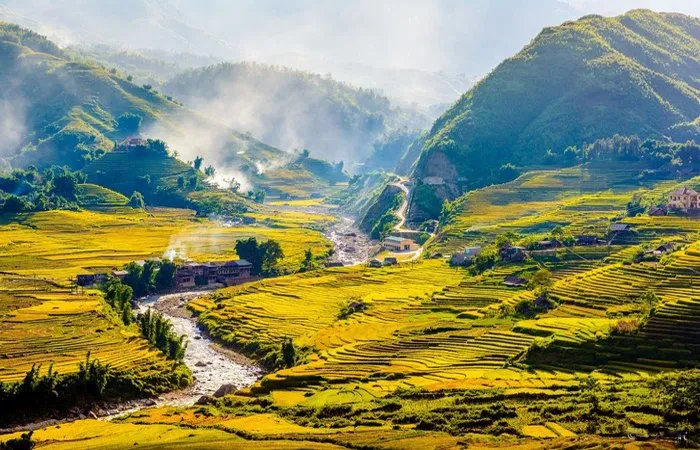
- Opening hours: all-day
- Entrance fee: Lao Chai Village - Ta Van: 75,000VND per adult and 50,000VND per child - Ban Ho Village: 40,000VND/person
2.6. Sapa's waterfalls: Silver Waterfall and Love Waterfall
Not only does it appeal to people by mountains and terraced fields, but Sapa also has waterfalls like ribbons of white silk. Among the waterfalls, the most beautiful are Silver Waterfall and Love Waterfall.
The Silver Waterfall is located at the foot of O Quy Ho Pass, from the gulch, the white water flows like a silvery silk ribbon, rumbling with white foam when it meets the rocks at the foot.
- Opening hours: 7:00 AM - 7:00 PM
- Entrance fee: Adult: 20,000VND - Child: 10,000VND
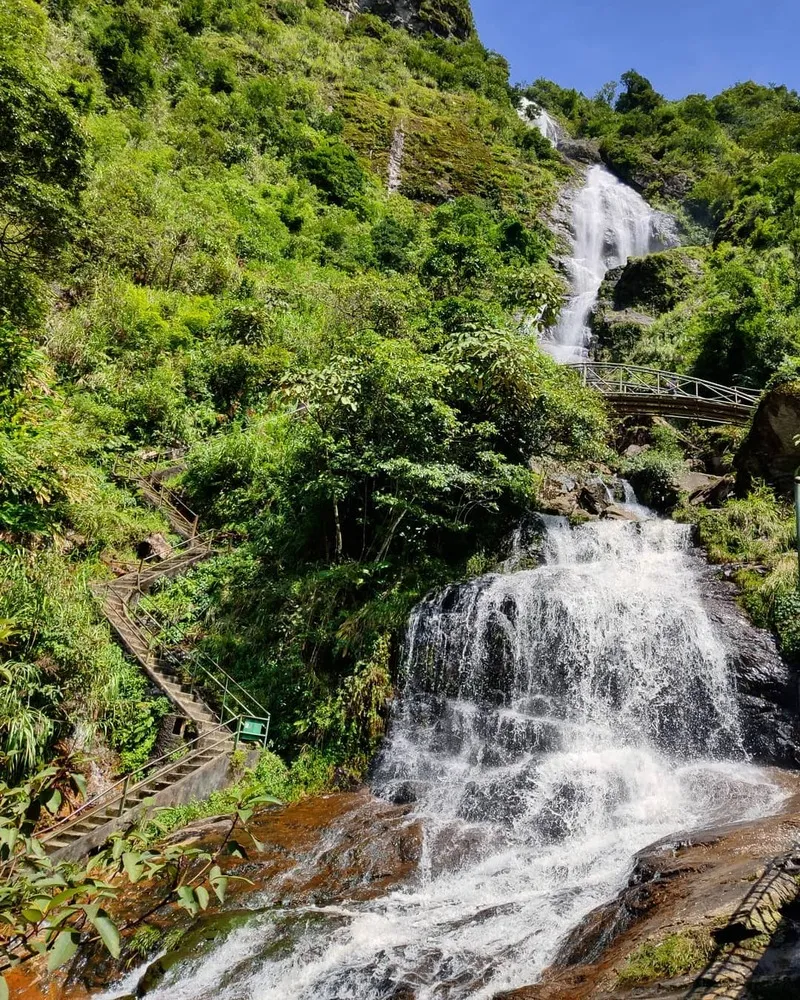
Silver waterfall
The Love Waterfall is given by a sad love story of the woodcutter O Quy Ho and a celestial fairy. They love each other but are forbidden to be together.
- Opening hours: 8:30 AM - 5:00 PM
- Admission fee: Adult: 70,000VND - Child: 30,000VND
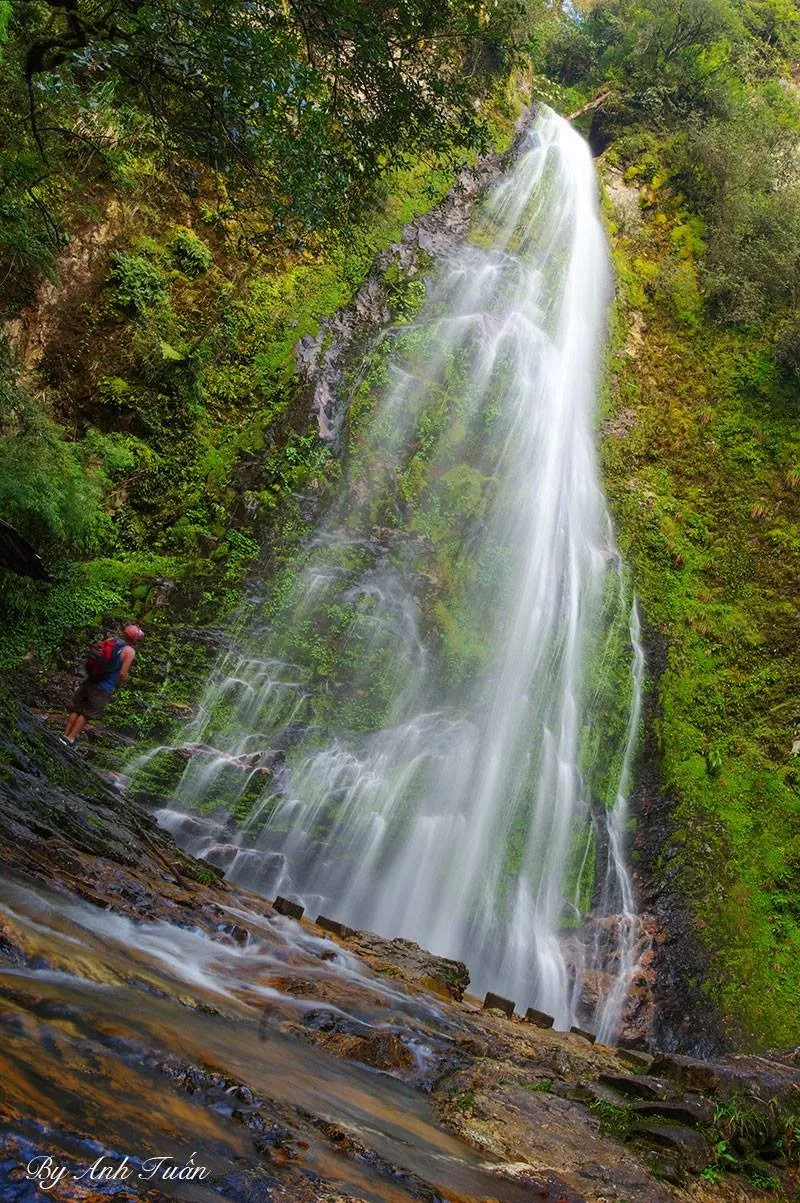
Love Waterfall
2.7. O Quy Ho Pass
Located 17 km from the centre of Sapa, O Quy Ho Pass is located on the border of two provinces Lai Chau and Lao Cai. It is one of the longest, most dangerous and majestic mountain passes in the northern mountainous region of Vietnam. Besides the name O Quy Ho, it is also known by the extremely poetic name - the Cloud pass, being at the altitude of nearly 2,000 m above sea level, covered with clouds all year round.
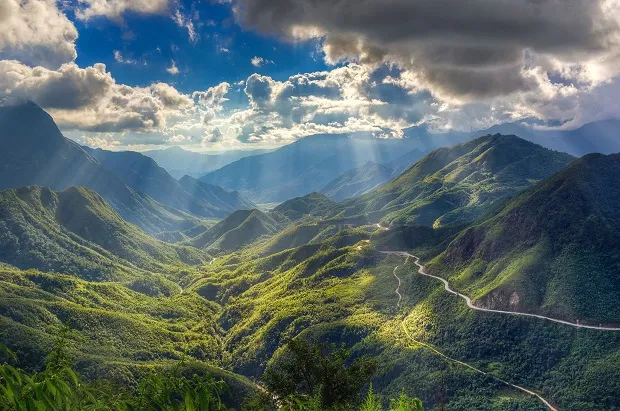
O Quy Ho Pass, along with Ma Pi Leng Pass, Pha Din Pass, and Khau Pha Pass, are the four major passes in the Northwest. In addition to the above title, O Quy Ho pass is also known as the longest and highest pass in Vietnam in 2013 by the Vietnam Records Organization with a length of nearly 50km.
2.8. The colourful ethnic markets
Although most multi-ethnic markets are not found in Sapa, you cannot miss a chance to visit these colourful markets. They are not just a place to trade, the sight in vivid ethnic markets in North Vietnam is a special way to see the culture of ethnic groups.
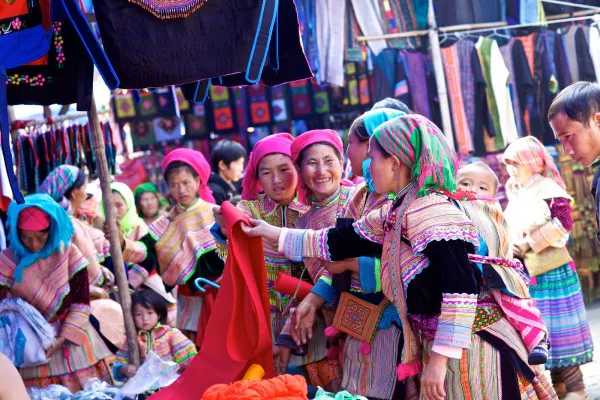
Among the beautiful markets in the North, the markets in Bac Ha are most beautiful and closest to Sapa: Coc Ly market on Tuesday, Sin Cheng market on Friday, Can Cau market on Saturday, and Bac Ha market on Sunday.
- Opening hours: 07:00 AM - 12:00 PM on specific days
- Admission fee: free
See more: 15 Best ethnic markets in Northern Vietnam
2.9. Sapa Town
We have already listed attractions in the vicinity of Sapa that have very special beauties. However, the town centre also has its own peculiarity; it is like a modern city in the middle of the mountains. Among the modern hotels, in the centre of Sapa Square, you can see the ancient Cathedral of Sapa, and among the chaos of tourists from all over the world, you can feel the quiet corners around the central lake of Sapa and the pictures of street vendors in traditional dress.
In the evening, be sure to make a stop at the Sapa Night Market, where you can sample many Sapa specialties. The atmosphere is strange but very interesting!
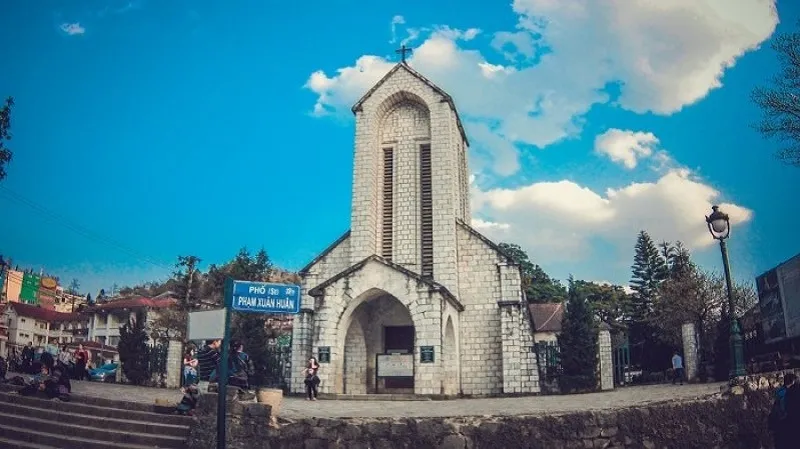
2.10. Other off-the-beaten-path attractions in Sapa
Besides the attractions mentioned above, you can put some interesting places on your list if you have a lot of time in Sapa.
- The Oolong Tea Hills
This picturesque destination is located near O Quy Ho Pass. The tea hills attract photographers by its stunning views of rolling hills covered in vibrant green tea plants, interspersed with colorful cherry blossom trees. Visitors can wander through the tea plantations, learn about the tea-making process, and even participate in tea-picking activities. During late November and December, the hills come alive with the vibrant pink hues of cherry blossoms.
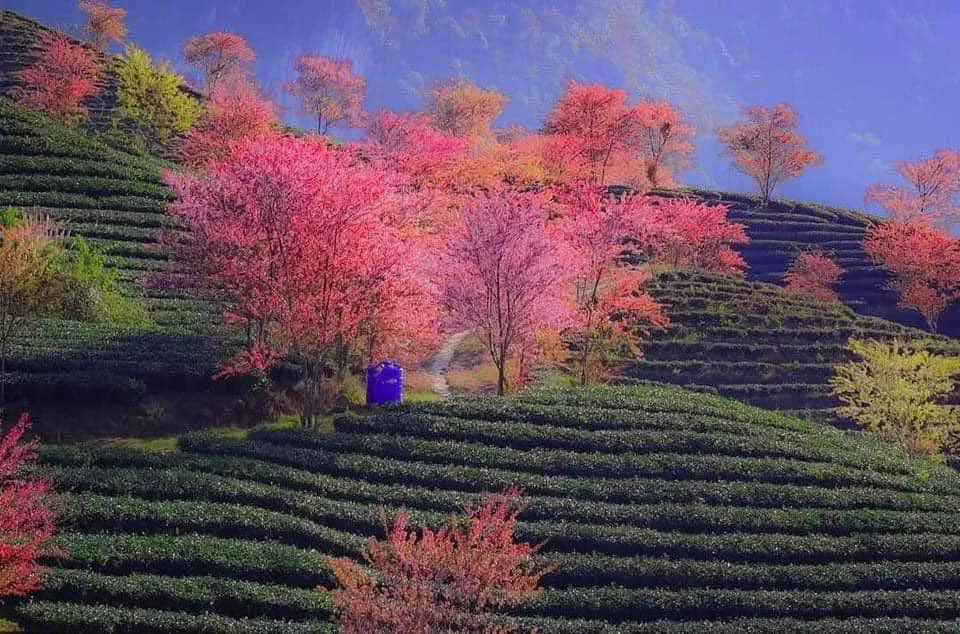
- The Hau Thao Village
Hau Thao provides an opportunity to experience the rich culture of the H'mong people. It is a great base for exploring the surrounding area on foot as its trails leading to many other villages in Muong Hoa Valley.
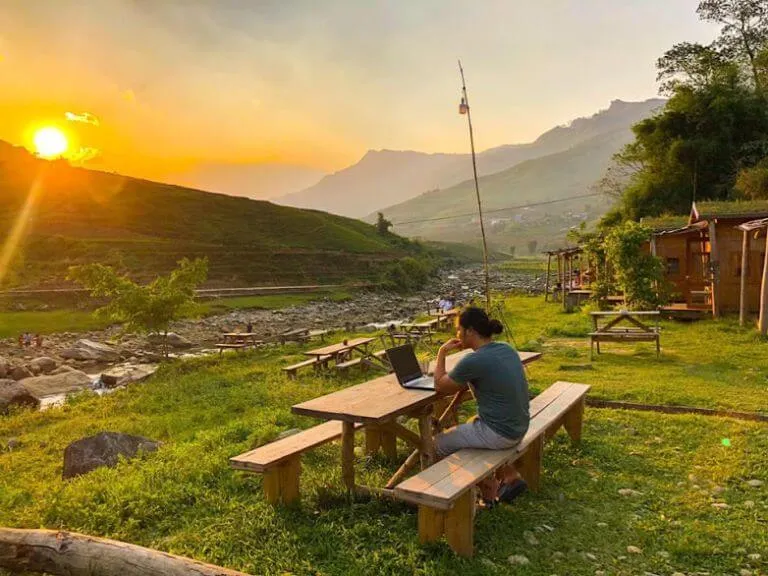
- The Nam Cang Village
Though being remote than the above two attractions, Nam Cang is filled with with fewer tourists. The pace of life remains slower and peaceful. This charming village is home to the Red Dao and Xa Pho ethnic minorities. Here you can observe the intricate weaving techniques, relax with a traditional herbal bath for the fullest experience.
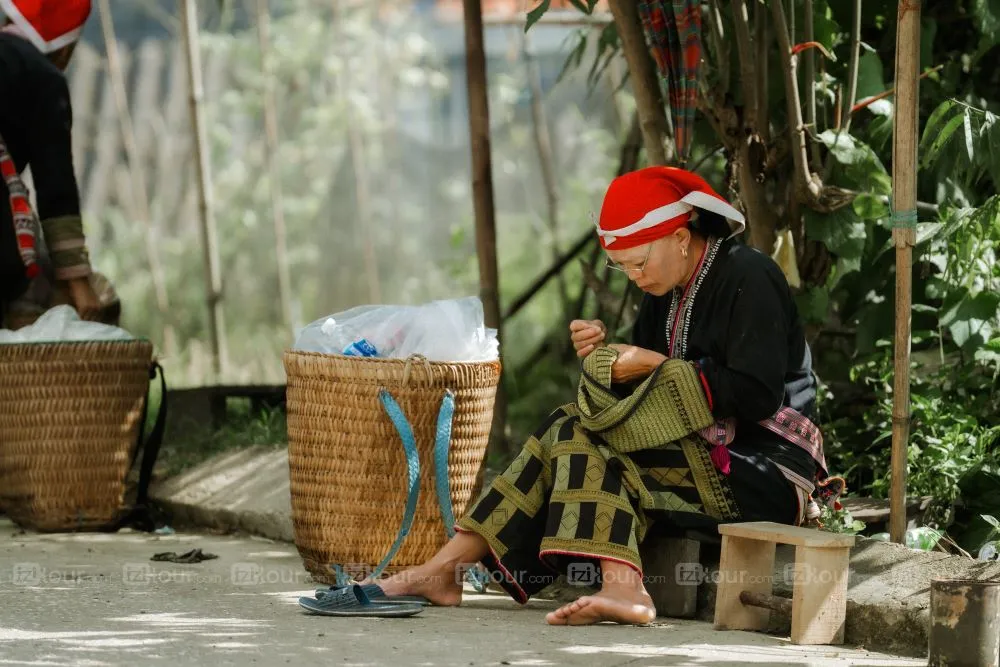
- Ban Khoang Village - Ta Giang Phinh
Ban Khoang and Ta Giang Phinh are two neighboring villages located in a scenic valley. Ban Khoang is especially known for its cardamom farms, where you can see how this spice is cultivated and processed. Ta Giang Phinh is nestled in a picturesque valley surrounded by terraced rice fields, lush forests, and the impressive Ngu Chi Son peak. These two villages both offer a tranquil escape from the crowds.
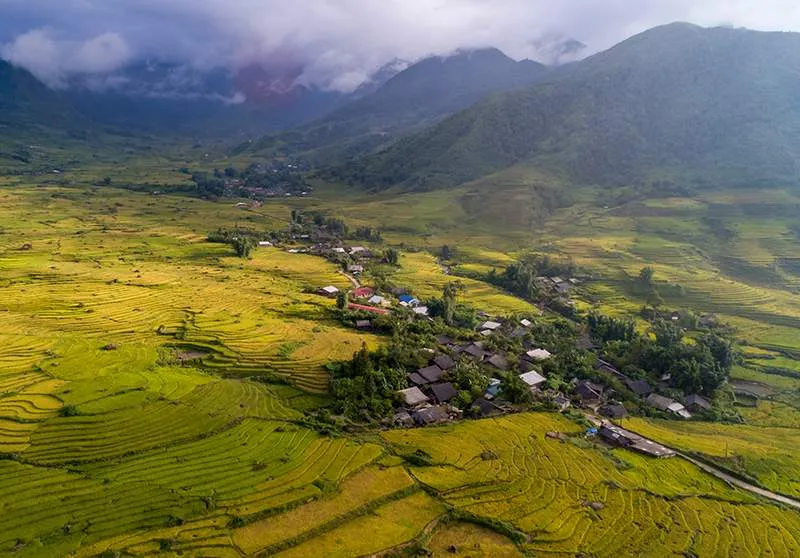
- Y Ty
Known for its breathtaking scenery, unique culture, and tranquil atmosphere, Y Ty is a truly off-the-beaten-path experience. You can find some of the most beautiful and unique terraced rice fields in Vietnam here. Y Ty is even famous for its mesmerizing "sea of clouds" phenomenon, where a thick blanket of clouds often covers the valleys, creating a surreal and magical landscape.
3. Suggested itineraries for Sapa tour
3.1. Sapa itinerary 3 days
This itinerary offers a fantastic blend of Sapa's poppular attractions and a bit of authentic cultural experiences within 3 days. You'll explore the charming town, conquer Indochina's highest peak with a thrilling cable car ride, learn about the culture of ethnic minorities in Cat Cat and Ta Phin villages, and be captivated by the breathtaking beauty of Muong Hoa Valley.
Day 2: Fansipan Peak & Muong Hoa Valley (visit Lao Chai & Ta Van villages)
Day 3: Visting Ta Phin Village - get back to Hanoi
3.2. Authentic Sapa itinerary 3 days
Normally, tourists choose this itinerary if they want to visit the more authentic part of Sapa and its surroundings. With this itinerary, you can maximise your time by using the night train. Note that markets are not there every day, so you should note them well, as we have mentioned in the part of the markets in Bac Ha.
Day 2: Admiring the beauty of Y Linh Ho & Lao Chai Villages
Day 3: Visiting Bac Ha Market & experiencing authentic village life
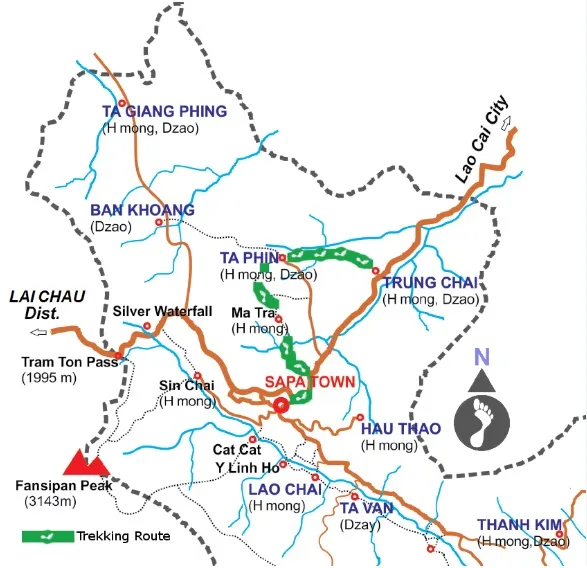
Sapa trekking map (Source: Sapa Tourist information center)
3.3. Sapa and Northwest Vietnam itinerary 5 days
In the summer months, especially from July - September, such an adventure will be ideal for those who love nature and on the hunt for Vietnam's stunning mountain photos. For this tour, you will need at least 5 days.
Day 2: Nghia Lo - Mu Cang Chai: trekking and witness the terrace fields in
Day 3: Mu Cang Chai - Lai Chau - Sapa
Day 4: Admire the beauty of Y Linh Ho, Lao Chai, Ta Van Villages
Day 5: Visiting Bac Ha Market & experiencing authentic village life
Sapa remains one of Northern Vietnam’s most remarkable destinations — a perfect blend of natural beauty, cool mountain air, and diverse ethnic culture. Whether you’re planning a short escape or an in-depth exploration, understanding Sapa in detail will make your trip far more rewarding.
If you’d like more practical tips or a tailor-made itinerary, feel free to reach out to IZITOUR’s local travel experts at [email protected]. We’ll help you organize a journey that fits your interests, budget, and travel style perfectly.
See more:
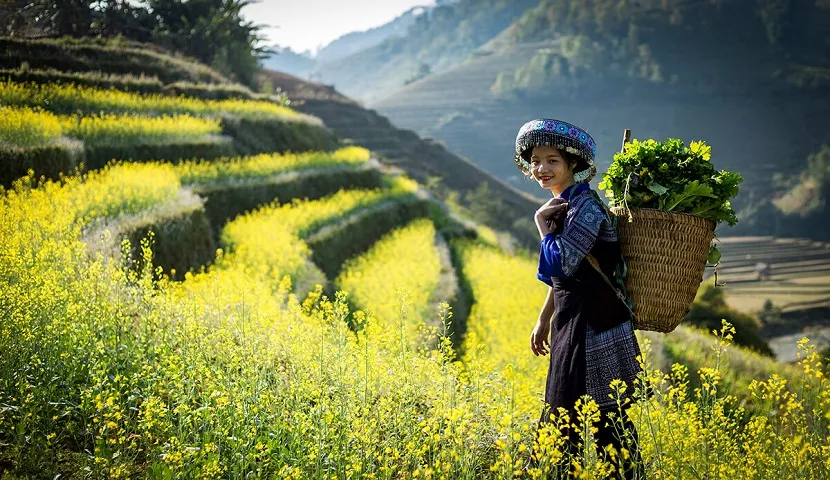
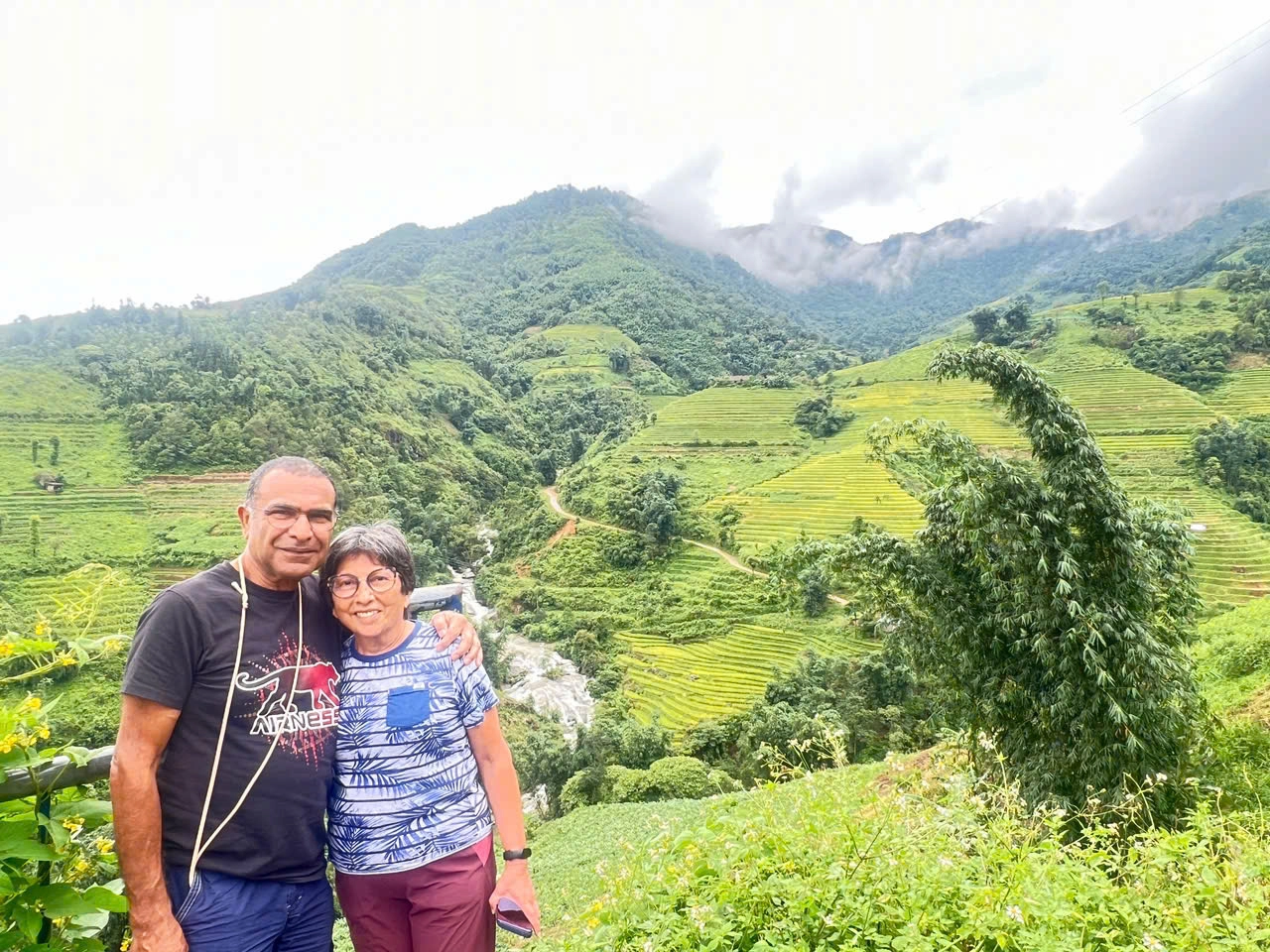
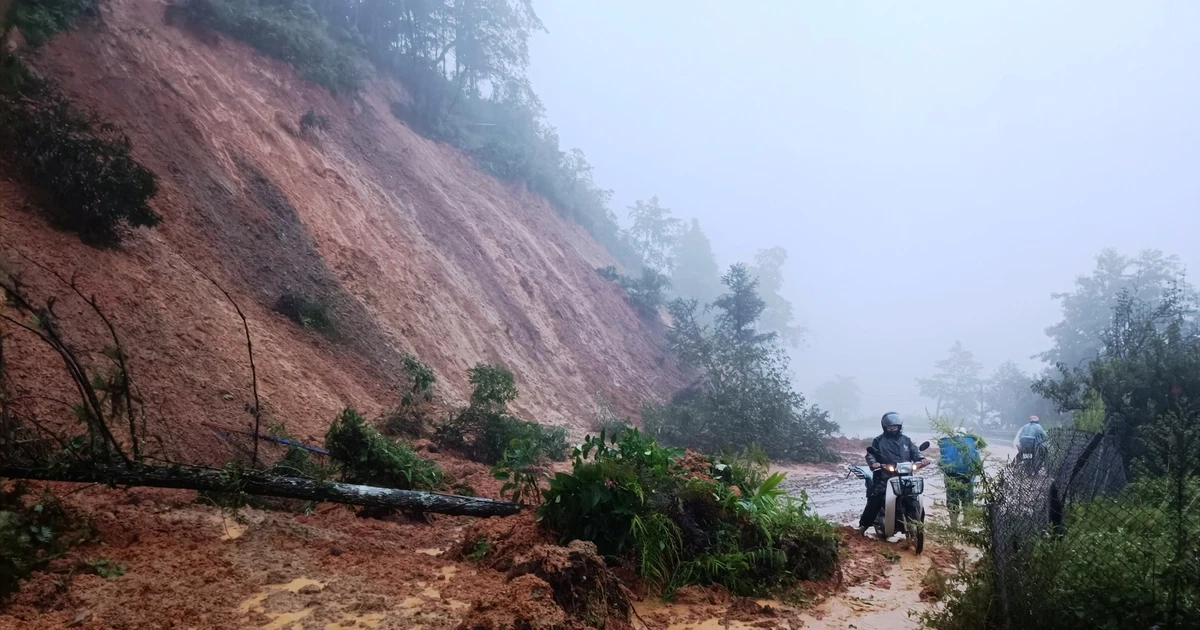
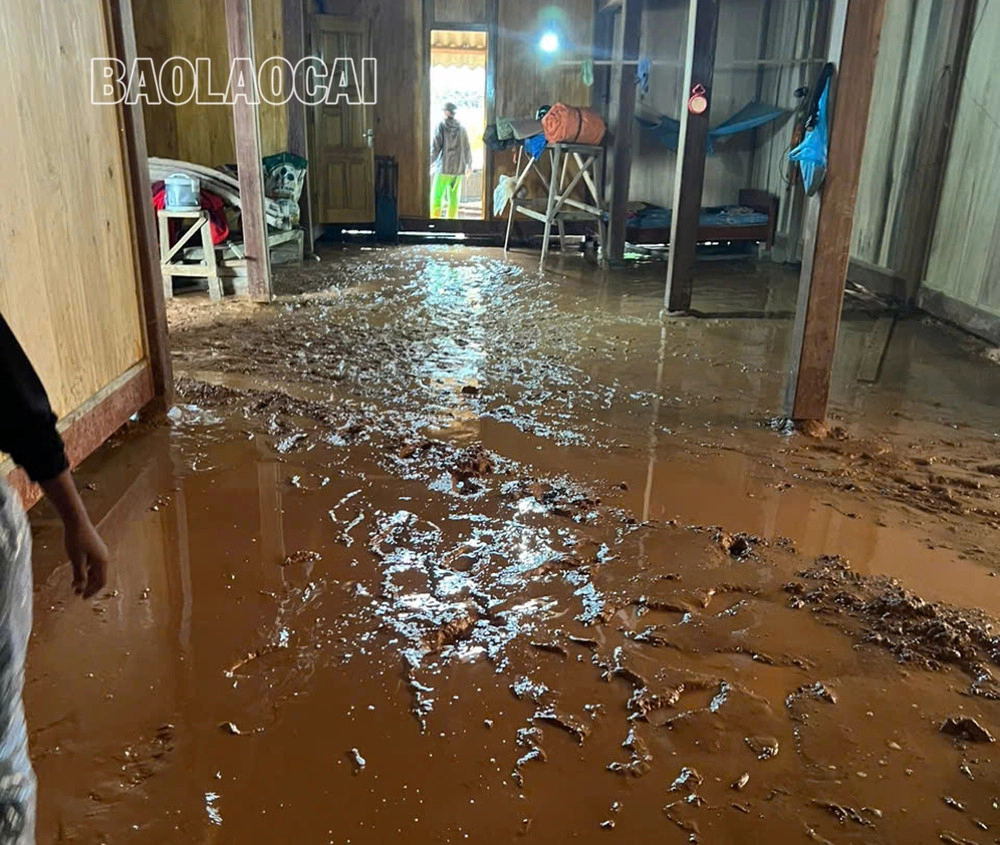






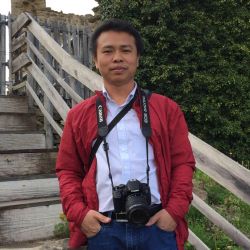
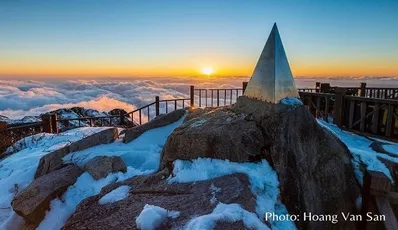
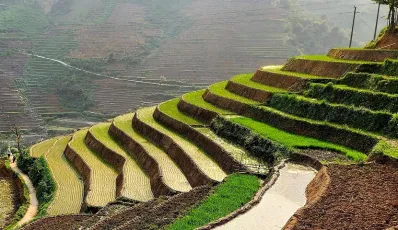
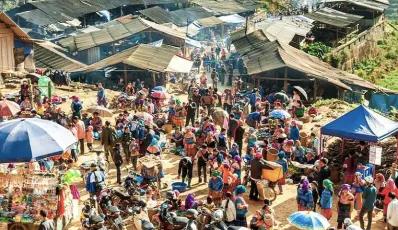
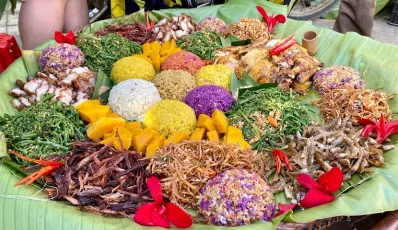
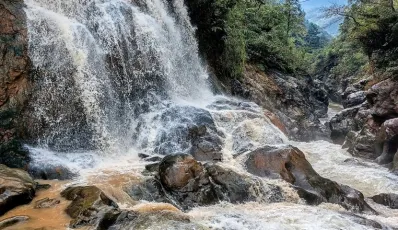
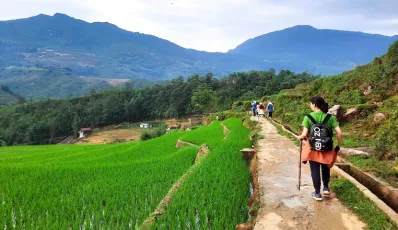
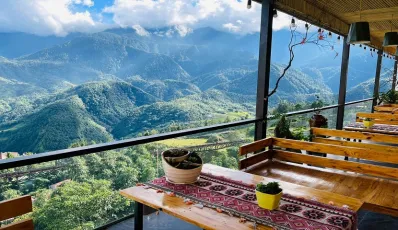
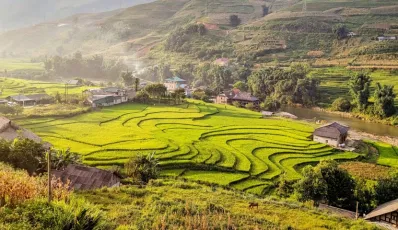
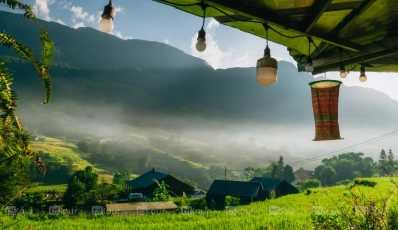
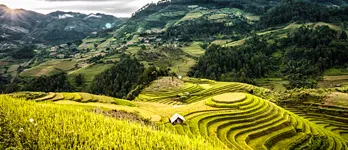
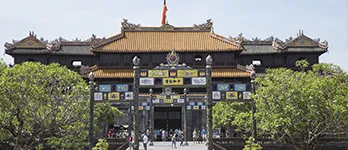
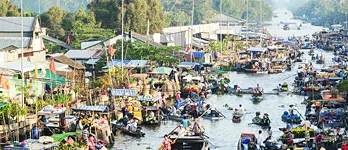

 TRAVELERS' CHOICE 2025
TRAVELERS' CHOICE 2025 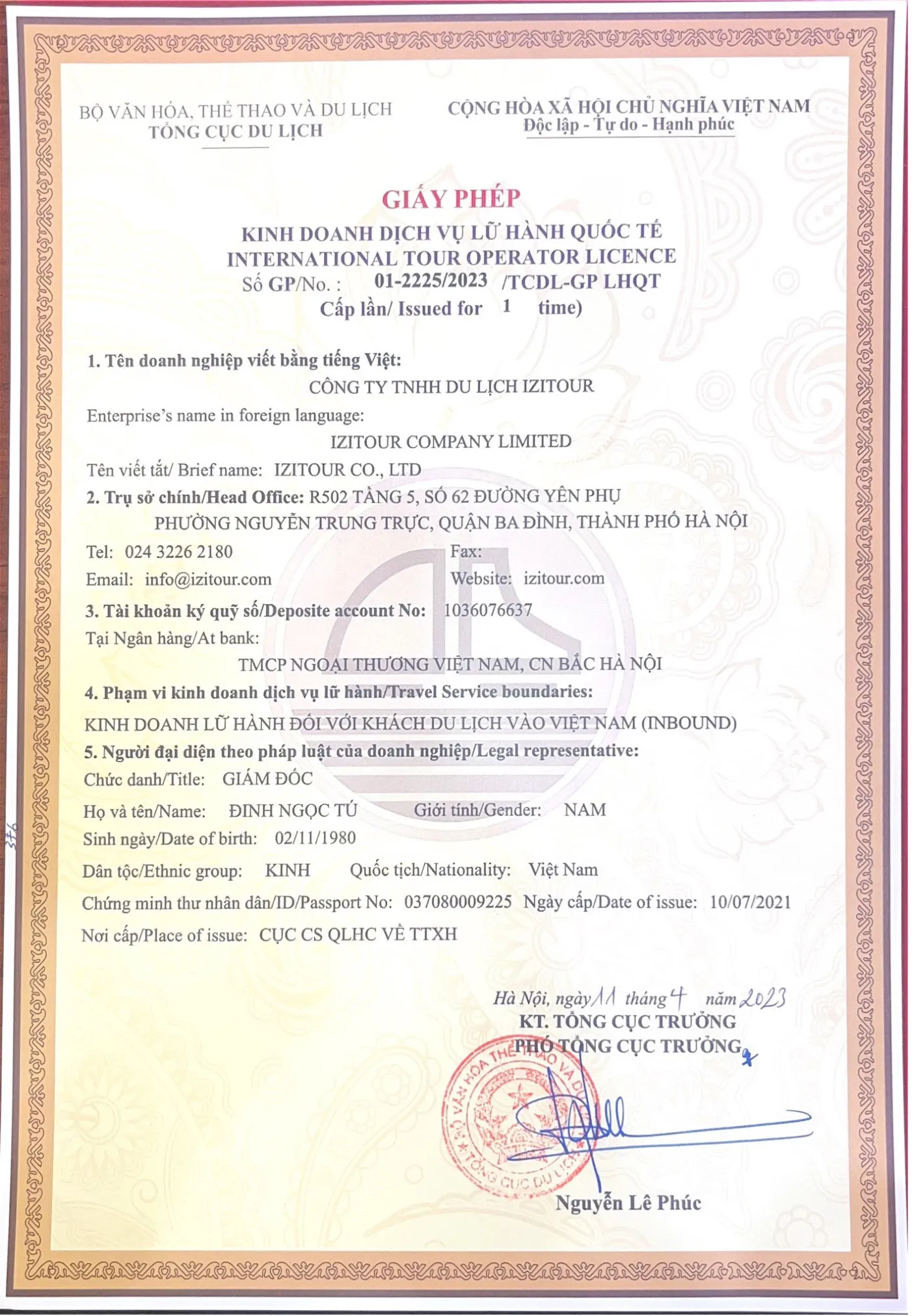



06 Comments
Greece
Vietnam
Yes. Sapa is not only famous for its breathtaking scenery but also for its rich cultural heritage, reflected in the many traditional festivals held by local ethnic communities. Among the most remarkable:
- Gau Tao Festival (Hmong ethnic group)
Taking place in the spring (usually January or February, following the lunar calendar), this festival is organized to pray for prosperity, good harvests, and health. Visitors can witness colorful traditional costumes, enjoy folk songs, and see traditional games such as tug-of-war and crossbow shooting.
- Roong Poc Festival (Giay ethnic group)
Held in Ta Van village around the first lunar month, this festival is dedicated to praying for favorable weather and abundant crops. It features vibrant dances, local music performances, and a warm community atmosphere.
- Fire Dancing Festival (Red Dao ethnic group)
Usually held after the harvest season, this unique festival showcases the bravery of Dao men as they dance barefoot on burning coals, believed to bring strength and protection to the community. Joining these festivals offers travelers a rare opportunity to experience the authentic traditions of Sapa’s ethnic minorities. Since most festivals follow the lunar calendar and dates may change each year, it is recommended to check the schedule in advance when planning your trip.
Italy
Vietnam
Salve, vorrei suggerirvi di fare un tour del Vietnam al Nord e al Sud solo a dicembre, perché questo è il periodo delle frequenti piogge nel Vietnam centrale. E quando tornerete in Vietnam a marzo, questo è il periodo ideale per visitare il Vietnam centrale e potrete anche combinare un tour in Cambogia. Per maggiori informazioni sul clima in Vietnam, leggete questi articoli: Viaggiare in Vietnam a Marzo - tutte le informazioni da sapere e Viaggiare in Vietnam a Dicembre: informazioni pratiche. Se avete bisogno di ulteriori consigli per il vostro viaggio, non esitate a contattarci via e-mail: [email protected] o Whatsapp: +84 382 536 266. Grazie!
Italy
Vietnam
Write Reply